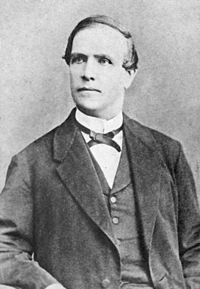Francisco Adolfo de Varnhagen
| Francisco Adolfo de Varnhagen | |
|---|---|
 |
|
| Born |
17 February 1816 Iperó, Brazil |
| Died | 26 June 1878 (aged 62) Vienna, Austria |
| Occupation | Military, diplomat, historian |
| Nationality |
|
| Ethnicity | White |
| Alma mater | Colégio Militar |
| Notable works | História Geral do Brasil |
| Spouse | Carmen Ovalle y Vicuña |
| Relatives | Friedrich Ludwig Wilhelm Varnhagen |
Francisco Adolfo de Varnhagen, Viscount of Porto Seguro (February 17, 1816 – June 26, 1878), was a Brazilian diplomat and historian. He is the patron of the 39th chair of the Brazilian Academy of Letters. He is considered "the father of modern Brazilian historical scholarship."
Varnhagen was born in 1816, in the city of Iperó, Brazil. He was the son of Maria Flávia de Sá Magalhães and Friedrich Ludwig Wilhelm Varnhagen, a German-born military engineer, who was in service to the Portuguese crown and in Brazil to inspect iron foundries. He received his primary education in Rio de Janeiro. At an early age, he went with his family to Lisbon, where he studied at the Real Colégio Militar da Luz. In the civil war in Portugal, he served those supporting Dom Pedro I. He returned to his studies, where he learned paleography and studied political economy and languages (French, German, English).
His first History work would be Notícia do Brasil, written between 1835 and 1838. His research would lead him to find Pedro Álvares Cabral's long-lost grave at the Igreja da Graça, in Santarém. He was admitted at the Sciences Academy of Lisbon and graduated in military engineering at the Academia Real de Fortificação, Artilharia e Desenho.
He returned to Brazil in 1840, entering at the Brazilian Historic and Geographic Institute in 1841. In 1844 he obtained Brazilian citizenship, and could apply to a diplomatic career. He served in Portugal and Spain, where he was able to utilize the archives In Seville and Simancas for his history of Brazil. He later served in Paraguay, where he found the current regime of Carlos Antonio López odious, but he gathered further materials for his history of Brazil, particularly on the Tupí Indians. He also served in Venezuela, the Republic of New Granada (modern Colombia), Ecuador, Chile (where he met his wife, an aristocratic Chilean lady Doña Carmen Ovalle y Vicuña, marrying her in 1864), Peru and the Netherlands. He published the first volume of his masterpiece, História Geral do Brasil, in 1854. Its second volume was published in 1857.
...
Wikipedia
